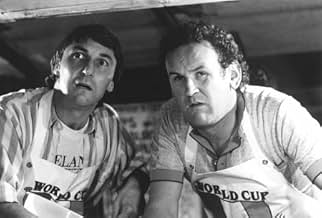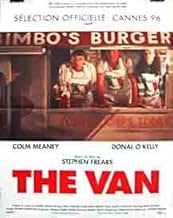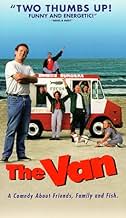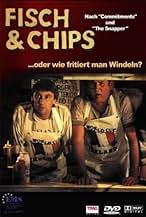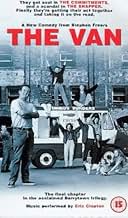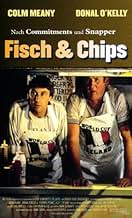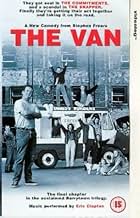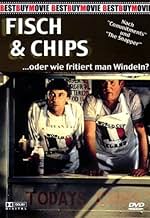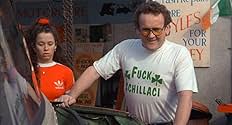Set in the fictional Dublin suburb of Barrytown, Bimbo is a baker who loses his job after being made redundant. Bimbo then acquires the help of his best friend, Larry, to set up a successful... Read allSet in the fictional Dublin suburb of Barrytown, Bimbo is a baker who loses his job after being made redundant. Bimbo then acquires the help of his best friend, Larry, to set up a successful burger van.Set in the fictional Dublin suburb of Barrytown, Bimbo is a baker who loses his job after being made redundant. Bimbo then acquires the help of his best friend, Larry, to set up a successful burger van.
- Awards
- 1 nomination total
Featured reviews
This is the story of two men belonging to the the Irish working class who after being sacked decide to start a business with a van for making and selling hamburgers and the like stuff. After a while their mutual relationship turns into a boss-employee one and things began to become worse until because friendship is thicker than money they began again to get well along with each other. The story is told in a half serious half funny way. It's very simple but not the less deep because of that. It's full of amusing episodes and details of everyday life but its very true, authentic and realistic.
OK, apparently, Colm Meaney (happy birthday, Colm!) is best known for a "Star Trek" role, but I always associate him with his roles in adaptations of Roddy Doyle novels. They are "The Commitments", "The Snapper" and "The Van". The last one casts as a down-on-his-luck Dubliner who with his friend finds a grimy abandoned van and opens it up. While I mostly liked the movie, it did have the problem of showing the Irish drinking and moping about life's travails; is that the only way to stereotype people from the Emerald Isle? But otherwise, I found it a pretty good look at working-class life in Ireland. Once again, Stephen Frears added another accomplishment to his resume, recently continued with "The Queen". I recommend it, and see whether or not you want to get a bite to eat from any random van after watching this.
Booker prize winner Roddy Doyle , who started life as a school teacher in a depressed neighbourhood in Dublin, the capital of Ireland, offers us a vivid yet humorous slice of life in Dublin at a pivotal time in contemporary Irish history. He tells this story from the perspective of down trodden families living in a depressed yet resilient neighbourhood. What is truly brilliant about this film is not just the hilarious storyline or the magical performances but how it captures the moment when Ireland as a nation got back on its feet and began to embrace Europe and world with renewed confidence. The story is set during the monumental moments of the European Football Championships of 1988, EURO'88 , when the Irish soccer team surprised Europe, and not least the Irish, with their success. It has been said that this event and the continued success of the Irish soccer team in Italia 90 sparked a renewed confidence within Ireland which greatly contributed to the success of the Irish economy in recent years, now known as the Celtic Tiger. The Barrytown trilogy written by Doyle has given us 3 memorable film adaptations in 'The Commitments'; 'The Snapper' and now this the final episode 'The Van'. Roddy Doyle went on to win the Booker prize for 'Paddy Clarke , ha, ha, ha' and is one of the foremost novelists active in Ireland today. His comedy and dialogue use the often thick Dublin working class dialect, which add to the lyrical nature of the scenes. Most of the characters are in turmoil due to their circumstances and the comedy lies in their posturing with each other in a dead-pan, black comedy.
Two Irish men with wives and children find themselves on the dole. One of them buys a large van and turns it into a "chippy." Naturally, he asks his best friend to work there with him. These two approaching-middle-age men have to work incredibly hard, but do have some success at the venture. It doesn't take long, however, for the friendship to get in the way. The one who fronted the money for the van is the boss, and the other one who didn't put up any money to get the small business going is the employee, who eventually becomes bitter at drawing a weekly paycheck from his best friend, who joins a union and begins antagonizing his best friend about labor laws, and whose insecurity in life shows clearly -- after all, the job isn't glamorous by any means, and of course, the reality of it is far removed from his dreams, we should imagine. The tension grows between the two. Set in Ireland during a World Cup Finals competition in soccer, this film gives us an intimate, grungy peek at the everyday realities of the poor in Ireland. It's "grand" to venture forth and set up one's own business and get off the dole, but of course, things are unlikely to run smoothly.
It's November 1989. Bimbo (Donal O'Kelly) is fired from the bakery. His best mate Larry (Colm Meaney) is struggling with only welfare for the coming Christmas. Bimbo is about to consider a MacDonald McJob when the guys are shown a food van. It's a piece of junk that doesn't even have an engine. Bimbo's wife buys the van and he invites Larry to join him selling fish and chips. Their chips van does smashingly as Ireland advances in the World Cup.
It's a steady decline from 'The Commitments' to 'The Snapper' and then to this. A more direct connection would have been better but I'm not an entertainment lawyer. It's still a fun watch. Donal O'Kelly doesn't have the screen presence. Colm Meaney is back and he overshadows everybody else. The trick is to make these poor losers lovable. Colm Meaney has that in spades. It would be better for them to get a steady young kid as their third. The relationship in the van is where this movie could have excel more. The guys' friendship could be more likable. I especially didn't like them picking up the ladies at the bar. Even their bickering could have been done with a lighter touch. Nevertheless it's still a fun ride.
It's a steady decline from 'The Commitments' to 'The Snapper' and then to this. A more direct connection would have been better but I'm not an entertainment lawyer. It's still a fun watch. Donal O'Kelly doesn't have the screen presence. Colm Meaney is back and he overshadows everybody else. The trick is to make these poor losers lovable. Colm Meaney has that in spades. It would be better for them to get a steady young kid as their third. The relationship in the van is where this movie could have excel more. The guys' friendship could be more likable. I especially didn't like them picking up the ladies at the bar. Even their bickering could have been done with a lighter touch. Nevertheless it's still a fun ride.
Did you know
- TriviaThis is the third story in Roddy Doyle's "Barrytown Trilogy", following the adventures of the Rabbitte family. However, as 20th Century Fox owned the film rights to the Rabbitte name (from The Commitments), the characters had to be re-named in the subsequent film adaptations (The Snapper, The Van).
- GoofsThe movie is set during World Cup 1990, and on at least two occasions, the radio can be heard promoting 98FM. This station did not use this branding until the mid 1990s; it was called Classic Hits at the time.
- Alternate versionsIn the UK in 2007 a re-edited version was passed for certification for video release by the BBFC running at 92 minutes 50 seconds, some 3 minutes 55 seconds shorter than the normal theatrical version.
- SoundtracksWand'rin' Star
Words by Alan Jay Lerner
Music by Frederick Loewe
© Alan Jay Lerner/Frederick Loewe/Chappell & Co Inc
By Kind Permission of Warner Chappell Music Limited
- How long is The Van?Powered by Alexa
Details
- Release date
- Countries of origin
- Official site
- Language
- Also known as
- La camioneta
- Filming locations
- Production companies
- See more company credits at IMDbPro
Box office
- Gross US & Canada
- $712,095
- Opening weekend US & Canada
- $23,366
- May 18, 1997
- Gross worldwide
- $714,197
- Runtime
- 1h 40m(100 min)
- Color
- Sound mix
- Aspect ratio
- 1.85 : 1
Contribute to this page
Suggest an edit or add missing content


